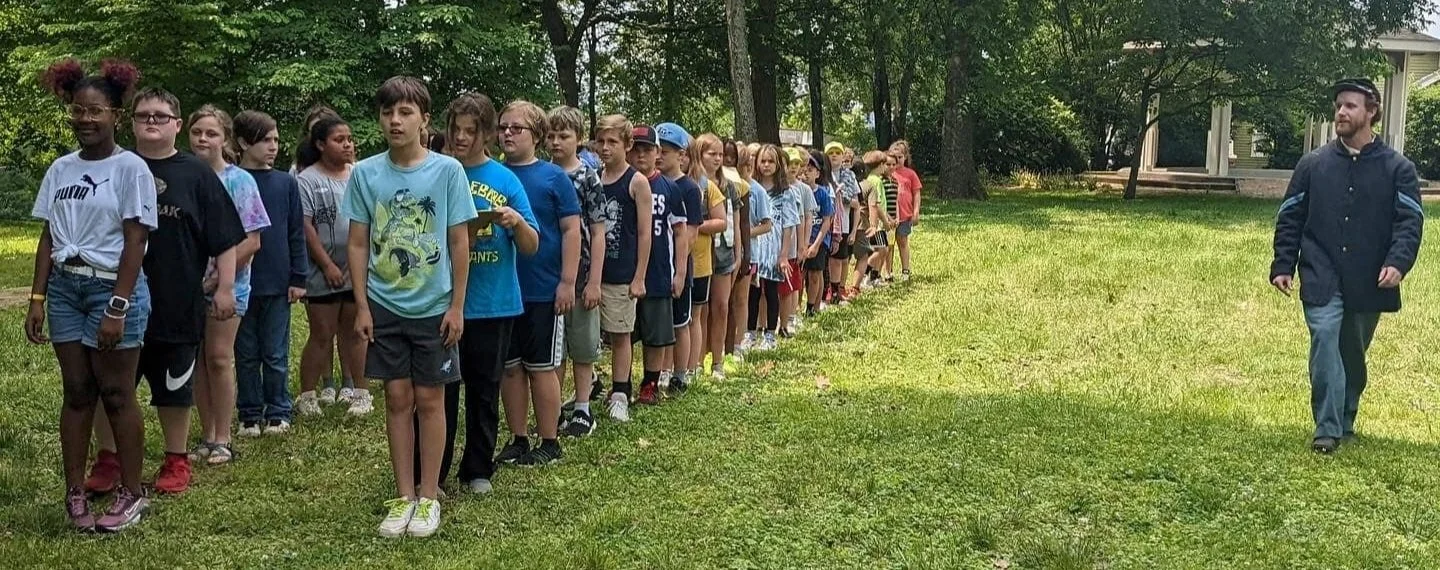The Mabry-Hazen House Museum offers fee-based programming that meets Tennessee social studies curriculum standards. School groups up to 75 students are divided into groups of not more than 25 students and rotate through the museum stations. Depending on group size, stations can be presented simultaneously. The presentations are approximately 30-40 minutes in length.
To schedule a Field Trip for your students, please send an email to director@mabryhazen.com with your school group size and other pertinent information.
Best group size for maximum enjoyment and learning opportunity:
75 or less. If your group is larger, please contact us to discuss special arrangements. A headcount of 20 participating students is necessary to receive the group rate. All field trips below 20 participating students will pay 20 student minimum price (excluding chaperones).
Standard School Minimum: $100 (Excluding Chaperones)
Title1 Minimum: $50 (Excluding Chaperones)
For more information about pricing, please email: director@mabryhazen.com
Program Length: 2-3 hours, depending on program choices
Cost of Group Tour:
$5.00 for students
$5.00 for chaperones
No charge for public school teachers and bus drivers
$3.50 for Title One Students with a completed form.
DIVIDED LOYALTIES
LIFE OF THE SOLDIER AND HOMEFRONT IN KNOXVILLE DURING THE CIVIL WAR
LIFE OF THE SOLDIER
Goal: Educate students about the influence the Civil War had on the personal life of a soldier.
Experience the life of the common soldier through photographs, uniforms, music, weapons, and ordinary objects carried or worn by soldiers. Soldiers from both armies occupied Mabry's Hill, placing students on the ground where men from throughout the nation endured the hardships and routines of military life.
Costumed interpreters teach students how average citizens from the North and South learned to be soldiers, as well as the ways that life in the military affected their daily lives. Stations on camp life, drill, and music are available for experiencing life from the view of blue and gray soldiers. Interpreters also discuss Knoxville’s role in the Civil War and the ways men brought their cultural, social, and political beliefs to the battle lines.
LIFE ON THE HOMEFRONT
Goal: Educate students about the ways the Civil War deeply affected slavery and the personal lives of men, women, children, and communities in Tennessee.
Museum staff lead students through a tour of Mabry-Hazen House to explore the material culture of Knoxville families and the customs and practices that dictated private life in a Victorian home. Students learn about the history and function of calling cards and create their own cards to take home.
Students learn about the roles of women in nineteenth-century America and the “cult of domesticity” that prescribed their behavior and beliefs. They’ll also discuss how the war affected the daily lives of people living in East Tennessee.
The museum also addresses the institution of slavery in the house. Students learn about experiences of enslaved people like Eliza Franklin and her children. Following their experiences from enslavement to emancipation, students hear about their challenges and triumphs and why it’s important to tell their story.
Additional Policies and Information
Reservations are required for all school group visits.
Reservations are available on a first-come, first-served basis.
Upon arrival, children will ideally be divided into groups of 25 or less.
At least two teachers or official school representatives must accompany each group of students
School tours last approximately 2 hours, so please plan your travel and bathroom time accordingly.
Our grounds available for your group to use at lunchtime. We can set up tables for parents and teachers. Please let us know if you would like to take advantage of this opportunity.
Please think of Mabry-Hazen House as predominantly an outdoor classroom, although sections will occur indoors as well. Your students should be prepared for rain, dew, mud, heat, and cold. It’s worth it though!
Teachers and chaperones are responsible for their students and student behavior while visiting with us. Payment for your group can be made upon arrival at Mabry-Hazen House.
Payment for the entire group must be made in one transaction. Cash, credit, or school checks are acceptable forms of payment. Checks should be made payable to Hazen Historical Museum Foundation.
Please alert us if anyone does not have a media release, in case we decide to take pictures for promotional materials.




